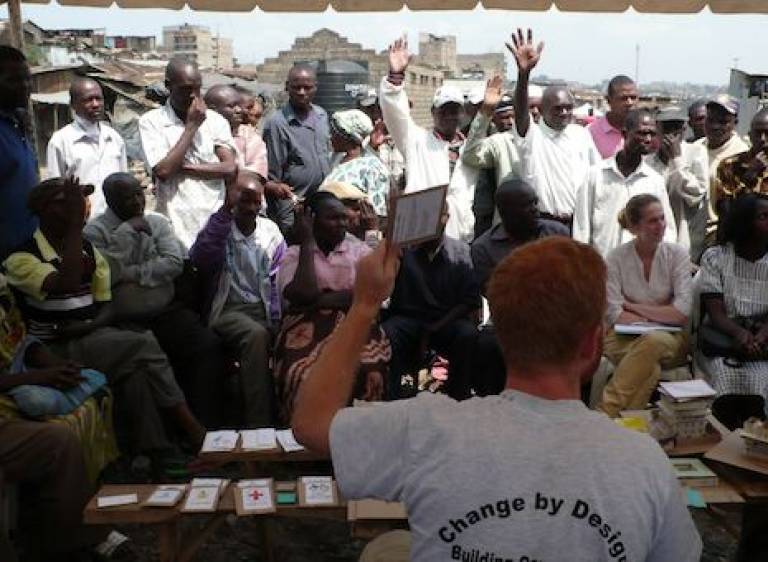Change by Design
12 December 2011
This book documents a two-week action research workshop, Change by Design, undertaken in Nairobi, Kenya from 19th June - 1st July 2011.

The workshop was developed and coordinated under the banner of Architecture Sans Frontieres - United Kingdom (ASF-UK), in partnership with the Pamoja Trust, a Kenyan NGO, and the Housing Policy Section of UN-HABITAT with support from the Development Planning Unit of UCL, the Royal Institute of British Architects, and the Scarcity and Creativity in the Built Environment Research Project.
The principal focus underpinning the workshop was an exploration of the opportunities and limitations of integrated community-led participatory design for responsive slum upgrading in Kenya, and the degree to which this community-led approach could not only build an improved physical environment but also recognise the social production of space; empower slum dwellers to be active agents of change; and build socially, economically, and environmentally sustainable communities.
In total over 65 participants were involved on a daily basis for the duration of the workshop. Workshop participants comprised 22 international ASF participants (students, and practitioners from a wide range of disciplines such as architecture, engineering, economics, and sociology); 25 local participants (mostly undergraduate students); 15 'key' residents of Mashimoni; and 3 workshop coordinators. Through investigations in Mashimoni, one village in the Mathare Valley, the workshop findings demonstrate the immense complexity of slum upgrading in Kenya, in particular the tension between individual priorities and needs, and those of the collective. Through analysis at the macro institutional scale, the meso neighbourhood scale, and the micro dwelling scale, the workshop highlighted the benefits of undertaking participatory design at these three scales, concurrently, and linking them together for residents to make trade-offs. Furthermore, this synchronised analysis facilitated negotiations and consensus building using the spatial dimensions as a medium to facilitate dialogue, which was successfully done in the final 'portfolio of options'exercise undertaken at the end of the workshop.
The workshop was coordinated by Alexandre Apsan Frediani (DPU lecturer), Isis Paola Nunez (DPU Alumni, and PhD candidate at Westminster University), Matthew French (UN-Habitat) and Naomi Shinkins (ASF-UK Associate).
To purchase a publisher-quality hard copy visit http://www.blurb.com/bookstore/detail/2776475
 Close
Close

